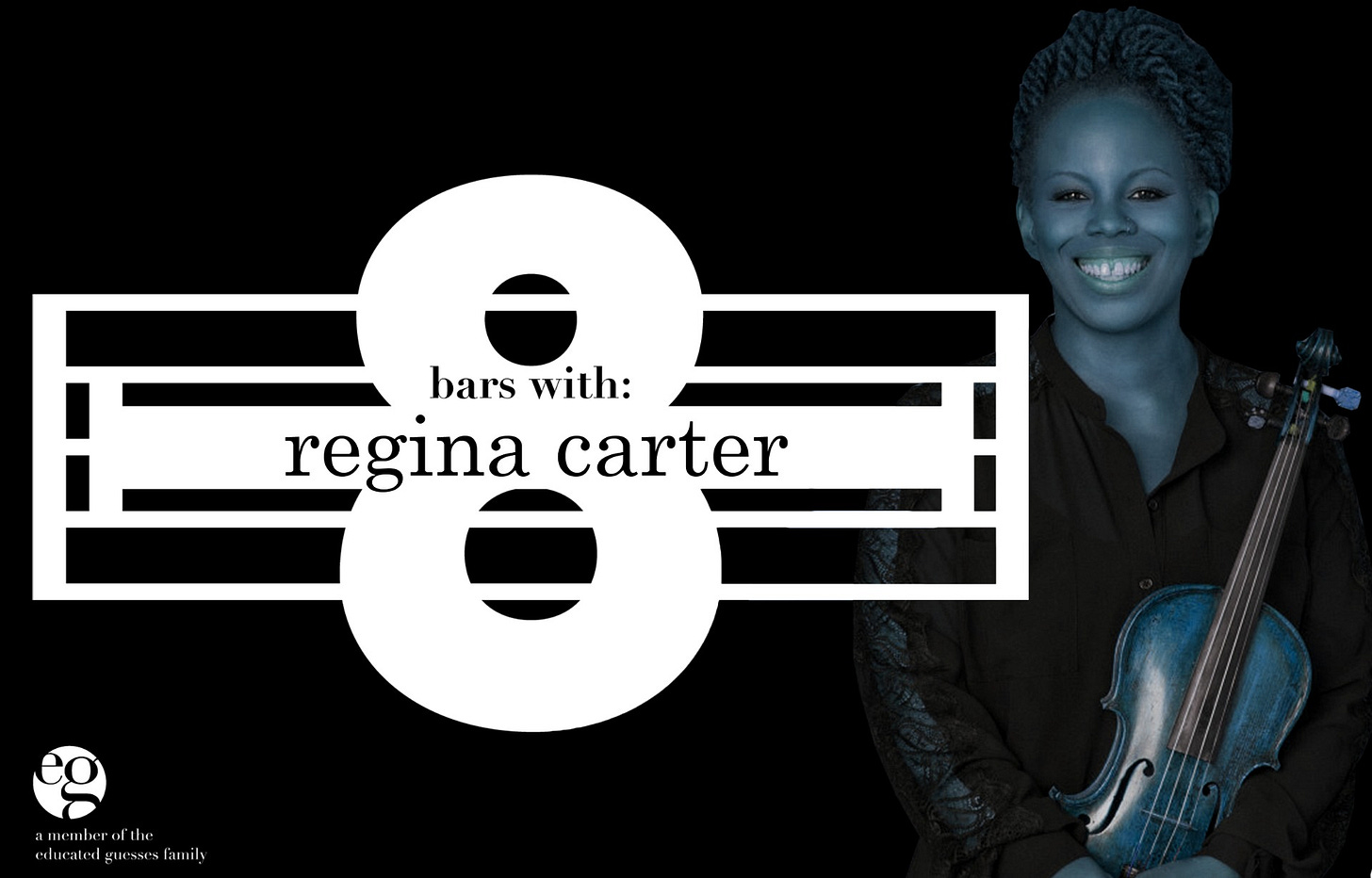8 bars with regina carter
Our guest is GRAMMY nominated jazz violinist/educator Regina Carter
8 bars with is a series on educated guesses where we offer up 8 questions to a special guest for them to ponder and freestyle on. The questions aren't necessarily questions as much as they are prompts or linguistic ink blots meant to stimulate thought. The responses can be short and pithy, long and loquacious or somewhere in between.
For three decades the Detroit-born, Grammy nominated, jazz violinist/educator Regina Carter has been the most accomplished musician on her instrument. A former child prodigy, and an alumna of Oakland University in Michigan, Carter has worked with a number of artists including pianists Danilo Perez and Kenny Barron, trumpeter Wynton Marsalis, and vocalists Aretha Franklin and Mary J. Blige.
She’s recorded eleven recordings as a leader, including Paganini After a Dream, which was inspired by her historic 2002 trip to Genoa, Italy, where Carter became the first African-American and jazz musician to play the violin of the legendary classical virtuoso, Niccolo Paganini. Carter was awarded the prestigious MacArthur “Genius” Grant in 2006, and the Doris Duke Award in 2018. Carter is the Artistic Director of the Geri Allen Jazz Camp, sponsored by NJPAC, is currently on the faculty of the Manhattan School of Music and New Jersey City University, and is Artist-in-Residence at the Oakland University School of Music, Theatre, and Dance.
1. When did you start studying the violin ...?
I started at age four. The Suzuki Method for strings (initially learned by ear) was being offered in Detroit. My piano teacher, Anna Love, thought this method of learning music would be perfect for me as I could play back whatever I heard.
2. Who are your main violin influences ...?
Stuff Smith, Itzhak Perlman, Noel Pointer, Jean Luc Ponty and Yehudi Menuhin.
3. What makes Detroit a great jazz city ...?
There has always been a tradition of the older generation of musicians taking the younger ones under their wings and giving young musicians opportunities on the bandstand. Folks like NEA Jazz Masters, pianist Barry Harris and vocalist Sheila Jordan, are still out here educating and sharing their lifetime of experience.
4. Who are some of the jazz stars from Detroit you grew up playing with ...?
Trumpet master Marcus Belgrave, organist, Lyman Woodard, pianist Ken Cox and the all-women’s group, Straight Ahead, to name a few.
5. What was it like recording and touring with the R&B group Brainstorm in the seventies ...?
That was such an amazing experience for me, and especially since I was still in high school. We opened for The Jackson's and Mother's Finest. It was surreal, and the charts were involved and exciting - no football whole notes for the strings.
6. How did your experience with Paganini’s violin change your life ...?
It was a huge honor to have the opportunity to perform and record with Paganini's violin. The recording and the whole story helped make Paganini; After A Dream, a very successful project.
7. Your latest CD, Swing States: Harmony in the Battleground, was about the 2020 election. Is jazz a democratic art form... ?
Yes, jazz is a democratic art form. There is a conversation happening on the bandstand in which everyone can have input but everyone has to listen as well. There are those rare situations where that doesn't happen.
8. How did the violin help you in highlighting your African and Appalachian roots ...?
When tracing my family history, so much of the music I was discovering during my search included the violin and African bowed instruments, such as the Endingidi, Riti, Goje and others. The violin provided a whole other fascinating layer to my research..
Bonus Question:
How did your classical training help you as a jazz musician ...?
Regardless of the genre of music with which one starts, technique, listening and feel are all important. I was fortunate that my first violin teacher, Jeanne Rupert, introduced us to improvisation at an early age. That experience has been extremely helpful to me as a jazz musician.


